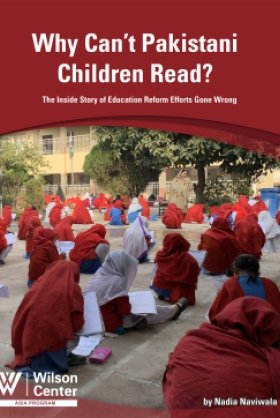Why Can't Pakistani Children Read? The Inside Story of Education Reform Efforts Gone Wrong (Report)



In Pakistan, millions of children are not in school. And yet, millions more are in school, where they must suffer through the effects of a broken education system. Even after many years of being in school, most of these children struggle to read and learn. After decades of building schools and enrolling children in them, the international community has been forced to confront the reality that schools in Pakistan—and elsewhere—are not delivering education, or even literacy.
The Wilson Center’s Asia Program, recognizing the immense challenge that Pakistan’s education crisis poses to the country’s development, has focused on this issue for many years. Its products include a book in 2005, a major conference in 2014, and an in-depth report by Nadia Naviwala called Pakistan’s Education Crisis: The Real Story. This report, published in 2016, shed new light on the challenges in Pakistani schools and sought to explain why so many have misdiagnosed the crisis.
Three years later, Naviwala, a Wilson Center global fellow and former public policy fellow, has produced this important new study, which picks up where her previous one left off. It highlights what has gone wrong in a country home to one of the largest externally funded education reform programs in the world—and where local government financing far exceeds the amount of that external funding. It addresses fundamental questions, such as why so many Pakistani children don’t learn and why so many of their teachers can’t teach. It also shatters myths about girls’ education and education budgets.
Part deep analysis and part investigative journalism, the report is based on visits to about 100 Pakistani classrooms; discussions with government ministers, other senior officials, technical experts, and international donors; and interviews with teachers and students. Above all, the report highlights the world’s collective responsibility for the failures of an education system shaped by a well-meaning, but flawed, decades-long effort to reform it.
The Asia Program is delighted to publish this timely and important new study, which we hope will contribute to the longstanding and ongoing debate about how to address one of Pakistan’s most fundamental and vital challenges.
Michael Kugelman
Deputy Director, Asia Program
Senior Associate for South Asia
Woodrow Wilson Center
July 2019
Why Cant Pakistani Children... by The Wilson Center on Scribd


The Indo-Pacific Program promotes policy debate and intellectual discussions on US interests in the Asia-Pacific as well as political, economic, security, and social issues relating to the world’s most populous and economically dynamic region. Read more
